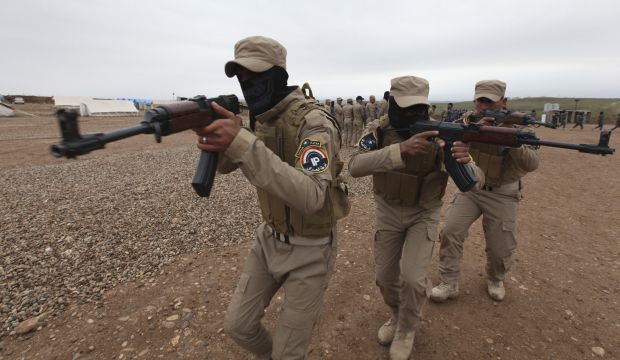
Iraqi security forces take part in training, as they prepare to fight against militants of the Islamic State of Iraq and Syria, at a training camp on the outskirts of Mosul on January 10, 2015. (Reuters/Azad Lashkari)
Baghdad, Asharq Al-Awsat—Iraq’s government has announced it has officially approved the creation of a National Guard force to assist in the fight against the Islamic State of Iraq and Syria (ISIS).
Earlier this week, Iraq’s cabinet agreed to the formation of National Guard forces, tasking a committee with completing the legal proposal to establish the new military force and to put it to a vote at the next cabinet meeting. This committee will be headed by Deputy Prime Minister Bahaa Al-Araji, and be made up of a number of senior government officials including Iraq’s interior and defense ministers.
“The National Guard law must be based on a nationalistic, not sectarian or political, view,” Araji said.
He stressed that while each provincial National Guard unit would be made up of local fighters, its command structure must be “centralized” and under the authority of the commander-in-chief. “The National Guard’s mission must [also] be explicitly specified,” he said.
The formation of National Guard forces, which would fall under the authority of each governorate and be comprised by local forces, was a major agreement made between Iraq’s various political factions and directly led to the formation of the Haider Al-Abadi government. Prime Minister Abadi has come under increasing criticism, including from within his own government, for his failure to move forward with the project.
In earlier comments to Asharq Al-Awsat, Iraqi Vice President Iyad Allawi said: “There are many issues that were agreed on before the formation of the current government which are currently being ignored. At the time, all political parties agreed on the formation of a National Guard force which was to be established in a legal manner under the framework of the state. However, this has now been delayed, and even a draft proposal regarding the formation of a National Guard force has been postponed and not put forward to the government for discussion. This delay represents a threat, not just regarding what is currently happening in Iraq, but to the future of the country.”
The call for the formation of a National Guard force, made up of local forces including tribal fighters, was strongly championed by Iraq’s Sunni political forces as a way of fighting ISIS and ensuring more sectarian parity in Iraq’s armed forces. It was also strongly backed by US officials charged with retraining the Iraqi armed forces in the wake of the Iraqi army’s collapse in the face of the offensive launched by ISIS in summer 2014.
In comments to Asharq Al-Awsat, Iraqiya bloc MP Misha’an Al-Juburi said that Iraq’s Sunni blocs were optimistic that Prime Minister Abadi would move forward with the creation of a National Guard force.
“The latest meeting between parliamentary speaker Salim Al-Jabouri and Prime Minister Abadi, which was also attended by Iraqiya MPs and ministers, was important and fruitful on all levels as Abadi responded to all the proposals and expressed his genuine desire to abide by the terms of his government program to ensure that Iraq gets out of this impasse,” he said.
